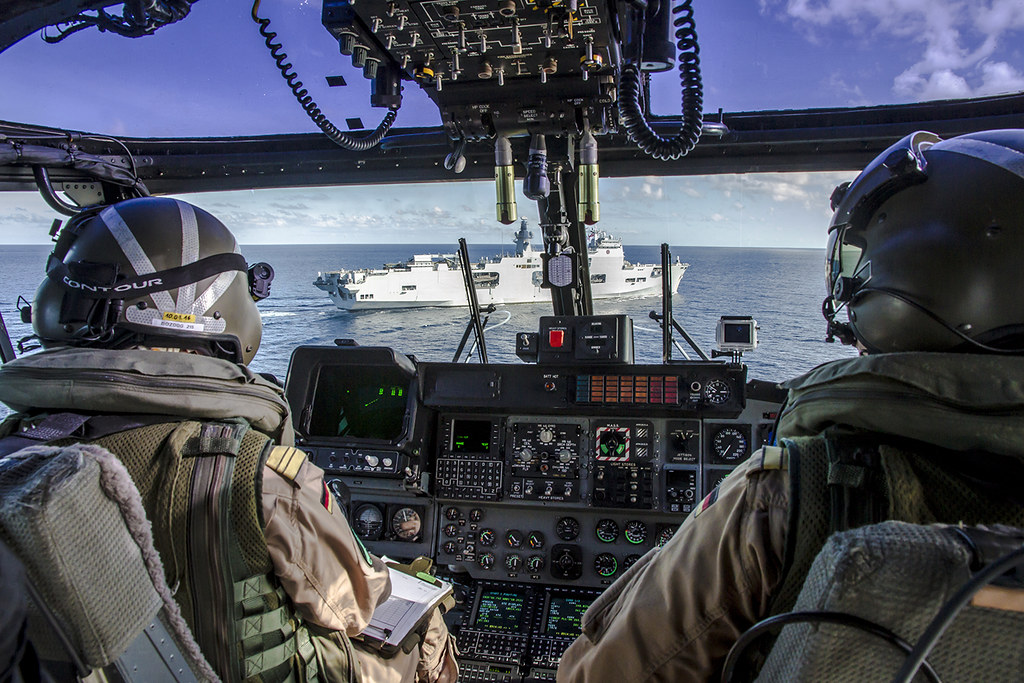Christopher Cowan, Thulasi Wigneswaran, Elisabeth Buchan and Alexander Vipond
Sea State
The Indian Navy’s anti-submarine warfare (ASW) capability received a boost this past week, with the commissioning of the INS Chennai. Equipped with two ASW helicopters as well as sophisticated sonar systems, the INS Chennai is optimised for ASW missions but also has a potent anti-air capability and boasts a stealthy design. The INS Chennai is the third and last ship of the Indian Navy’s Kolkata-class guided missile destroyers; the first two—the INS Kolkata and the INS Kochi—were commissioned in 2014 and 2015 respectively.
According IHS Jane’s, the Royal Danish Navy is looking to acquire SM-2 missiles for its fleet of Iver Huitfeldt-class frigates and will make a decision on planned frigate ballistic missile defence upgrades in 2018. The Danish frigates are admired by many (including some members of the US Navy) for their flexibility; equipping them with the SM-2 would add a punch to their arsenal.
Flight Path
It looks like Canada will be filling in its potential air combat capability gap with Boeing F/A-18 Super Hornets. Last week, the Canadian Defence Minister Harjit Sajjan announced that the country will launch a replacement fighter competition next year, with an outcome expected in five years. As an interim measure, Canada will explore acquiring 18 new Super Hornets. In response, Lockheed Martin announced that they hope Canada will eventually purchase the F-35 Joint Strike Fighter. During his election campaign, Canadian Prime Minster Justin Trudeau vowed not to invest in the F-35, despite contributing another C$36 million to continue as an international member of the aircraft’s development program. Check out this Strategist piece analysing the political nature of the decision.
Thales, the defence electronics company, is set to outdo Airbus DS in a French Army competition for a light, intelligence-gathering mini-UAV. Enter Thales’ Spy’Ranger. The mini-UAV has high-definition imaging capability, high-speed datalink, operational range between 15–30km and endurance of up to 2.5 hours; all factors which will likely see it secure the contract worth an estimated US$106 million.
Let’s take a moment to gaze into the crystal ball to see what lies ahead in the aerospace industry. Check out this Aviation Week gallery, which looks at the future of ubiquitous drones, 3-D printing and more.
Rapid Fire
According to Russian Navy newspaper Boyevaya Vakhta, the Pacific Fleet has installed 3K60 Bal and K300P Bastion-P anti-ship missile systems on the disputed Kuril Islands. The deployment was touted by Defence Minister Sergei Shoigu in March pursuant to Russia’s intentions to develop military and civilian infrastructure on the islands. Russia’s actions have stoked anger in Tokyo, as Japan also claims ownership of the islands.
The Abrams tank is set for a rejig. The US Army is working to upgrade the Abrams to make it more competitive against rival Chinese and Russian-made Main Battle Tanks. According to Scout, the SEP v4 variant will be ‘more lethal, faster, lighter weight [and] better protected.’ Proposed upgrades include a third generation forward-looking infrared camera to detect enemies at longer ranges, rear-facing cameras, enhanced mobility and power capability, and an active protection system—the first for any US tank. The tank will be equipped with the Army’s Advanced Multi-Purpose tank round; one common round to replace the four rounds currently in use. Testing is scheduled for 2021. The Australian Army might be an interested obsever, as its own Abrams will need some upgrades in the not too distant future.
Meanwhile Syrian rebels embrace Luddism, menacing their enemies with what appears to be a circa-19th century cannon.
Zero Gravity
A team at NASA has published a journal article confirming that they have built working Electro-magnetic drive thruster (EmDrive), in which electromagnetic energy bounces around in a closed chamber to generate small amounts of thrust (1.2 millinewtons in this case) with no fuel or propellant. The upshot is that the technology could allow spaceships and satellites to travel without carrying tons of fuel for near limitless distances. However, there’s a downside: it apparently violates the laws of physics. So does it really work? Another Emdrive concept, a Cannae drive, will be field-tested on a cubesat satellite in 2017, and the proof will be found in space.
Britain may have left the EU on Earth but it’s sticking by them in space. The British government has rejected a proposal to shift UK spending from the European Space Agency to its national space program. While the UK is seeking to expand its national space program with the establishment of a domestic spaceport and industry investment, the government has decided to keep a foot in both camps. That’s good news for the ESA, which will reportedly ask for an extra €400 million at their budget meeting in Switzerland this week.
Christopher Cowan, Thulasi Wigneswaran, Elisabeth Buchan, and Alexander Vipond are research interns at ASPI. Image courtesy of Flickr user Gonzalo Alonso.
This article first appeared on the ASPI "The Strategist" Blog and is reposted here under a Creative Commons license.

